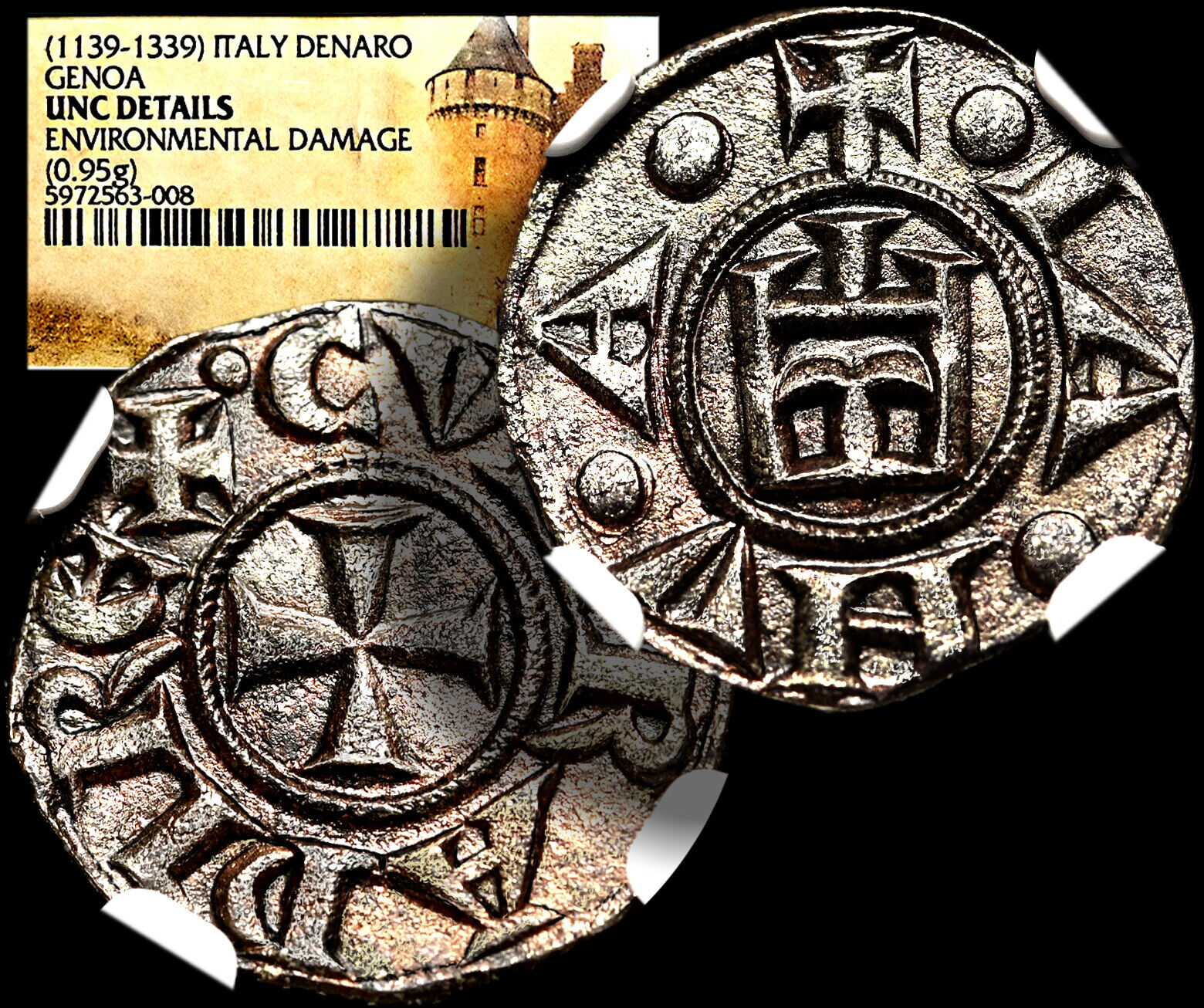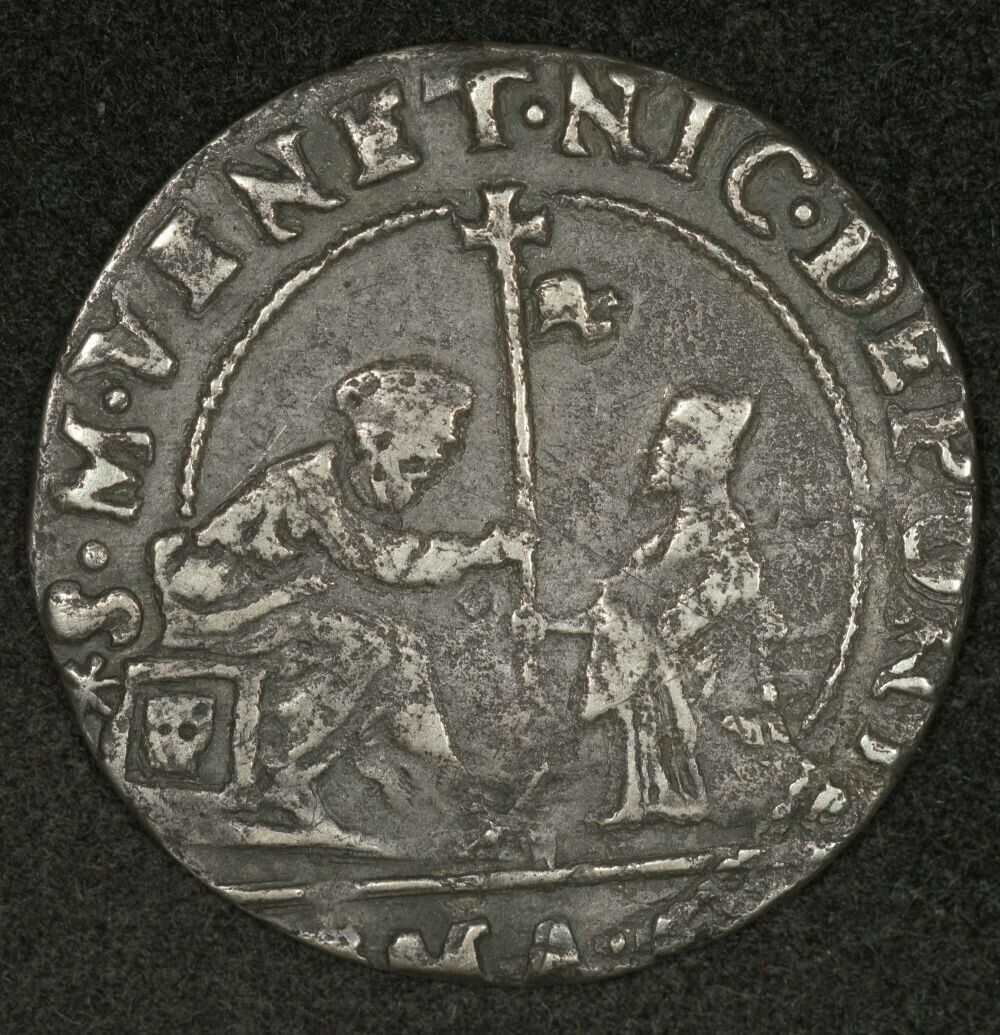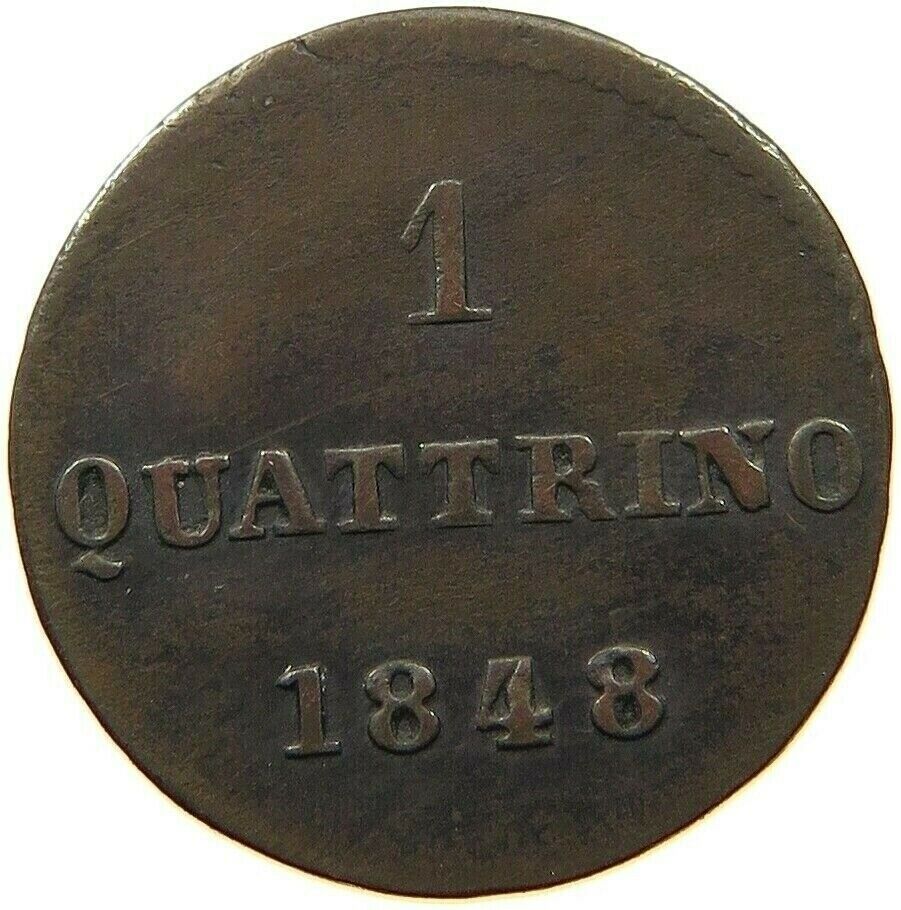-40%
ITALIAN STATES / Rare GENOA 1139-1339AD Æ SILVER Denaro Coin NGC UNC / GGcoins
$ 99.79
- Description
- Size Guide
Description
REPUBLICof
GENOA
Italian States - SILVER Denaro
ITALY - Circa; 1139 -1339 AD.
Silver Denaro,
weight; 0.95gm
NGC UNC
Obverse:
"Castle within circle surounded by
lettering"
+
•IA•NV•A• Translation: GENOA...
Reverse:
"Cross within circle surounded by
lettering" •CVNRADI REX... .
Ref;
CNI III# 77
Personalized COA included
The Coin:
A very pleasing & quite RARE
Silver denaro
coin ,
Well struck, in nice shape. NGC graded UNC, It saw little use and touched
few hands throughout history
before
it found a place
to wait out the centuries.
Always Authentic, I have never knowingly sold a copy or reproduction!
As grading
is subjective please Judge the coin photos to determine this for yourself.
____________________________________________
HISTORY of coin:
The Most Serene Republic of Genoa
(Italian: Repubblica di Genova, Ligurian:
Repúbrica de Zêna) was an independent state in Liguria on the northwestern Italian coast from 1005
onward, throughout the Middle Ages. The Republic was established to Genoa, Venice, and Pisa.
This enabled the Genoese to seize and monopolize trade in the western Mediterranean Sea.
By 1100, the Genoese had won the war against Pisa and seized most of its territory. They also managed to
conquer Sardinia. In its early centuries, Genoa was already becoming an important trading city and its power
began to increase.
Genoa started expanding during the First Crusade, launched by the Holy Roman Empire. Taking advantage of
the temporary weakness that overtook the Germans when the Holy Roman emperor was killed in battle against
the Turkish Sultanate, the Genoese pushed northward and defeated a large German force near Savoy.
This allowed for a swift Genoese advance that drove opposing forces as far as Switzerland, conquering all territory
around.
These Genoese expansions alarmed the other Italian states forming under the nominal rule of the Holy Roman
Empire in Italy, and they formed a Coalition of Tuscany to oppose more Genoese conquests.
In 1123, the Genoese Doge Vilhent Boccoli fought and defeated the Venetian Republic in a war over northeastern Italy.
This would lead to a future of rivalry with the Republic of Venice well into the 1300's. From 1130-1164, the Genoese
fought and subdued the Tuscany Coalition, as many Italians were hoping for a unified state to prevent direct occupation
nd control by the Holy Roman Empire. The German emperors themselves recognized Genoa as an independent and
sovereign state in 1204.
Throughout the 1200's, the Genoese were the closest to a united Italy as could be achieved.
All territory north of the Papal States had fallen into the hands of the republic, as well as all Italian lands west of Venice.
The Genoese also exercised control over Corsica and Sardinia.
By 1298, however, the Republic of Genoa had experienced serious decline. The Venetians had taken most of the trade,
and the old central Italian states longed to be free from Genoese rule. A series of greedy and foolish doges also corrupted
the republic, emptied the national treasury, and weakened it further.
To the praise of many Italians, the Genoese had stood up to the political monsters of the Holy Roman Empire and had
achieved the status of a symbol for Italian patriotism. When the Genoese had conquered northern Italy, many Italians
had hoped this would be a step closer to Italian unification. To their delight, the Genoese had also declared them liberated
and free from German claims and influences. However, as doges became more and more tyrannical, Italians became
alarmed at the growing instability under the Genoese. Genoese claims to Switzerland had also led to costly wars with the
Holy Roman emperors. Many Italians begin to feel that the Genoese cared only for their own expansion and political gain.
The wars in Switzerland dragged on from 1250-1300 and is estimated to have taken 30,000 Italian lives.
By 1304, a confederation of Austrian, and German nobles had defeated the Genoese and captured the doge in battle.
With the execution of the doge, Genoese claims to Swiss territory were dismissed. A series of losing wars followed as
the Holy Roman emperor regained much territory and drove the Genoese forces to the city of Genoa itself.
The fall of Genoa in March of 1306 is considered to be an end of an era of Genoese dominance over Italy.
Throughout the mid 1300's, Genoa regained a measure of its former fortune as they were ruled by a doge from Corsica
and Sardinia, which they continued to maintain. Northern Italy also remained under their control. Genoese merchants
began to establish trading colonies in Constantinople and Trebizond, both along the silk route, as early as 1333.
The decline of Venice and the consistent rivalry with the Venetians won out when the Venetians lost all of their Balkan
footholds to the king of Hungary and the Byzantine emperor. Croatia was the final Venetian province to fall, in 1340.
After the growing Byzantine Empire supplanted the declining Hungary in the early 1400's, the Genoese formed an
alliance with the Greeks in order to crush Venice between them.
Several royal marriages brought the Byzantine imperial dynasties closer to the doge, and the Genoese promised they
would behave as honorable allies in times of peace and honorable enemies should it ever come to war.
Such was the chivalric exchange between Greek and Italian worlds which finally brought Venice itself down in the 1420's.
However, the doge of Genoa lived only so long to win this victory when his assassination at the hands of the Holy Roman
Empire threw the republic into chaos.
Loss of Tuscany and Decline
Many Italians had long waited for the moment to overthrow Genoese suppression and revive nationalism in the form
of independent states, and the murder of the doge and disputes over his position caused the Italians of northern Italy t
o rise up in revolt against the Republic of Genoa. Together, they formed a loose confederation that ousted the Genoese,
and formed the Duchy of Tuscany, presided over by an independent duke.
The duchy was short-lived as the Byzantine Empire saw its chance to expand into Italy in the midst of the confusion.
While they supported several pretenders to the title of doge over Genoa, they absorbed the Duchy of Tuscany,
attacking it with such vicious determination and overwhelming force that the unstable and newly installed duchy was
quickly overthrown after a 400-day war. The Greeks initially hoped to expand farther westward and absorb Genoa itself,
but a rising new political faction led by a relative of the previous doge claimed the throne and re-established the
shrunken republic after recapturing the city itself from the Germans.
Revival and Peace
The Byzantines welcomed the re-establishment of Genoa, and provided support and congratulations to the new
doge and the restored republic. However, relations remained strained as the Genoese demanded the return of
Tuscany to their control. When the Greeks refused, several Genoese armies amassed on the border and prepared
for an invasion. The Byzantines mowed down the Genoese forces with aggressive tactics and sheer numbers,
shipping in troops from Naples and Croatia to deal with the invaders.
The Genoese invasion ended in late 1435, when the doge, seeing the odds stacked against him and hopelessly
outnumbered by the Greeks on the field, retreated to Corsica. Byzantium itself refused to war any further with
Genoa; it's force was spent. Throughout the 1470's, the Byzantine Empire developed better relations and strategic
alliances with the Genoese, farther westward expansion was instead directed at the Holy Roman Empire, resulting
in the capture of Vienna and the annexation of Austria. The Byzantine emperors adopted the title 'Protector and
Imperator of Helvetia', although Greek claims over Switzerland were largely nominal.
Genoese traders have since been granted exclusive trading rights in Constantinople and have established a colony
there on Thracian soil. They currently dominate most of the trade in the Mediterranean through a shrewd business
partnership with the Byzantine Empire to turn trade in the sea into a joint Greek-Italian monopoly.
------------------------------------------------------------------------------------------------------------------
Photos are of the actual coin that you will receive..!
Authenticity is guaranteed or your 100% money back. Please ask any question
Certificate of Authenticity--(COA):
What is a certificate of authenticity and what guarantees do you give that the item is authentic?
Several of the Ancient Coins sold here are provided with a Certificate of Authenticity, and a
Lifetime Guarantee of Authenticity
, issued by the owner and Art-antique enthusiast that has identified
thousands ancient coins and has provided them with the same guarantee. You will be very happy
the relevant information and a picture of your coin that is purchased in this listing.
Additionally, the coin is inside it's own protective coin flip (holder).
On the free-market such a presentation alone, can be considered a - value all in itself, and
it comes standard with your purchases from me, FREE. With every purchase, Whether your goal
is to collect or give the item as a gift, coins presented like this could be more prized and valued
higher than items that were not given with such care and attention.
-------------------------------------------------------------------------------------------------------
Payment info:
Payment should be sent within 3 business days from the auction's end. We accept PayPal in $USD
Return policy:
I
offer 30 day money back guarantee for this coin upon it's safe return,
if you are not happy with your purchase, I also offer a
LIFETIME
money back guarantee
if this coin is ever found to be Not Genuine or Historically Authentic by one of the Ebay
approved coin grading services... My goal is always your happiness and confidence in
purchasing my coin, in it's authenticity, numismatic and historic value!
Shipment info:
We usually ship within 2-3 business days after payment is cleared.
Please allow up to 5-7 days for item to be delivered ,
Orders over USD 250.00. will be Insured. We will only ship to your registered
PayPal address. Please be sure your address is correct before paying for the invoice.
International fees
will be determined by the
eBay Global Shipping
calculator
for your location - NOTHING Extra Added!
International Buyers – Please Note: Import duties, taxes, and charges are not
included in the item price or shipping cost. These charges are the buyer's responsibility.
Please check with your country's customs office to determine what these additional
costs will be prior to bidding or buying.
"Frequently Asked Questions"
How long until my order is shipped?
: Please allow 3 business days for shipment of
your order, after the receipt of payment.
How will I know when the order was shipped?:
After your order has shipped, I will update
you with a tracking # and will leave positive feedback.
After you shipped the order, how long will the mail take?
USPS First Class mail takes
about 3-5 business days to arrive in the U.S., international shipping times cannot be estimated
as they vary from country to country. I am not responsible for any USPS delivery delays,
especially for an international package.
Is there a money back guarantee?
I offer a 30 day money back guarantee. I stand behind this
coin myself, minus shipping expenses, within 30 days from the receipt of your order. My goal is
your happiness and confidence in purchasing this coin, in it's authenticity, numismatic and historic
value.
When should I leave feedback?
Once you receive your order, please leave a positive. Please
don't leave any negative feedbacks, as it happens many times that people rush to leave feedback
before letting sufficient time for the order to arrive. All issues can be resolved, my integrity &
reputation are very important to me!













